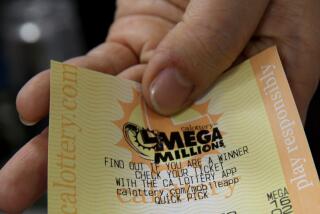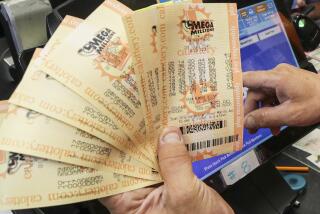Lotto May Be Changed, Director Says : Gambling: Embattled head says he is trying to attract more players. Proposals include 2-for-1 tickets, abolishing Quick Picks and returning to 6/49 game.
SACRAMENTO — California Lottery Director Chon Gutierrez, under fire for the lottery’s sagging revenues, said Thursday he will recommend major changes in the game of Lotto to attract more players, possibly including selling two chances for $1.
Gutierrez said he may recommend abolishing the computerized Quick Pick feature to increase the chances of larger jackpots or returning to the Lotto 6/49 game to increase the odds of winning. Lotto, which promises the biggest payoff of any of California’s lottery games, requires players to pick six winning numbers from a field of 53.
“The perception that Lotto 6/53 is unwinnable is leading people to think all of our games are unwinnable. It’s time to make a change,” said Gutierrez, whose job is in jeopardy.
Aides to Gov. Pete Wilson have said the governor is looking for a new lottery director and would name a replacement soon. Gutierrez was appointed to his $95,000-a-year job in 1987 by then-Gov. George Deukmejian.
Asked Thursday about the reports that he will be replaced, Gutierrez said as long as he holds the job, “I will diligently carry out my duties and responsibilities.
“When and if the governor wants to make a change, I pledge to him that I will cooperate in every way humanly possible in that decision process and any transition,” he said.
Some legislators and other critics have blamed Gutierrez for the lottery’s declining revenues, which dropped $400 million in 1990-91, or about 14% from the previous year. They point to the Lotto changes he proposed--particularly creation of the 6/53 game--which lowered the odds of winning.
Gutierrez said he plans to present short- and long-term recommendations to improve revenues when the state Lottery Commission meets Sept. 17.
Among ideas under review, Gutierrez said, is dividing a portion of large carry-over jackpots into smaller prizes for the next week.
He added that the lottery administration should be doing a better job of informing prospective players about how schools benefit from the 34% of lottery proceeds that is set aside for education.
“People tell us they think it’s the lottery’s responsibility to report on how the money is used in schools,” Gutierrez said, “and since they haven’t seen television ads reporting on this, they wonder whether the lottery is really giving the money to schools.”
Asked whether the schools or the lottery should be blamed for failing to deliver the message, he replied: “I am not prepared to say the schools have not done a good job. . . . It’s not a matter of fault. It’s a matter of reality.”
Fifty percent of state lottery income goes for prizes. After the schools’ portion is dispersed, the other 16% goes for operational costs, including retailer sales commissions.
The director noted that it takes three votes of the five-member Lottery Commission to make changes in the games of chance.
“The commission makes the decisions--not me,” Gutierrez said. “I merely recommend different strategies to them.”
Nonetheless, Gutierrez predicted that the 6/53 game “will be changed. But I am not convinced at this point that it will go away. Our players’ attitudes toward the lottery are changing quickly. We have to adjust quickly or sales will (continue to) drop.”
Gutierrez also called for a more aggressive marketing campaign to attract players. He said the lottery’s advertising budget has been reduced by 25% from last year to increase retailer sales commissions.
More to Read
Get the L.A. Times Politics newsletter
Deeply reported insights into legislation, politics and policy from Sacramento, Washington and beyond. In your inbox three times per week.
You may occasionally receive promotional content from the Los Angeles Times.










